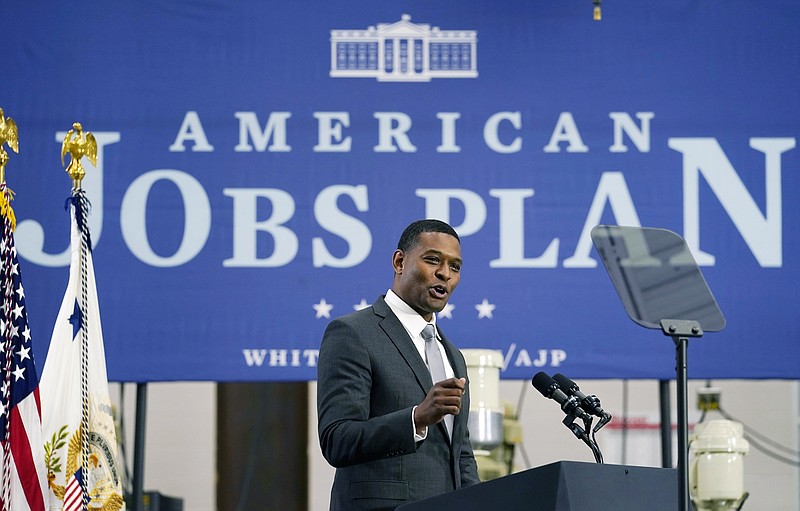A newly released Vanderbilt University survey of 1,000 registered voters in Tennessee has found that Republicans and Democrats have different opinions.
Don't you wish your job were that easy?
That the opinion of slightly more than .01% of the population of Tennessee is relevant may be dubious, but it doesn't keep such surveys from becoming news.
However, the results of such surveys, or polls, always rest on who is asking the questions, how the questions are asked and what the backing organization or candidates want the results to be.
It used to be that such queries were out to find statistically accurate opinions, but the hyperpartisan bent of the country has changed that. Most polls now are taken to show that "my side" is right, or leading, or favored.
That said, one particular question in the Vanderbilt survey about President Joe Biden's American Jobs Plan was intriguing because of how it was asked and answered, and what was left out in the asking.
The survey asked some participants if they approved of the president's plan, part of which would go to help improve the nation's infrastructure in the next decade, with help for roads, bridges, broadband, and other electrical and water projects.
Posed that way, with Biden's name attached, 96% of Democrats and 29% of Republicans approved.
When other participants were asked about a generic infrastructure improvement plan, 59% of Republicans supported it; Democratic support remained level.
If the questions had added relevant information, the results - from Republicans and Democrats - might have been quite different.
The $2.3 trillion plan itself contains only, depending on whom you ask, 7% to 24% of spending on "infrastructure." The lower end covers the bill's spending on bridges, highways, roads, ports, waterways and airports; it increases to nearly a quarter of the plan if you include broadband, modernizing the electrical grid and improving infrastructure resilience.
What do you think the results might have been if the Vanderbilt survey had posed the question: Do you support a $2.3 trillion federal government infrastructure plan that spends only 7% (or 24%) on infrastructure? Whether or not Biden's name was attached to it, it would have tanked.
Or: Do you support a $2.3 trillion federal government infrastructure plan, less than a quarter of which is spent on infrastructure, that increases corporate taxes from 21% to 28%? With or without the president's name, the numbers would've dropped like a rock.
As it is, administration supportive media outlets can say, based on the poll, that nearly 60% of Tennessee Republicans support an infrastructure plan.
In fact, an actual infrastructure plan with the 24% spent on actual needs would sail through Congress with actual bipartisan support. But it wouldn't contain all the spending on pseudo-infrastructure items that Biden and Democrats have tagged on the current bill.
The Vanderbilt poll also asked a question on a decidedly moot point: Did respondents agree with the statement that "Joe Biden stole the 2020 presidential election"?
Not surprisingly, 71% of Republicans agreed with the statement, not because they necessarily think the election was stolen but because they believe there was enough potential for fraud through mail-in ballots, states changing the rules at the last minute, and the widespread but minimal amounts of actual fraud reported.
The survey also found 30% of independents and 5% of Democrats believed the statement.
Biden is already president and will no more be rousted from that job than Donald Trump was when Democrats accused him of stealing the 2016 election. But polls that keep bringing up "a stolen election" are done so for a reason - to keep reminding voters that Trump, and therefore Republicans, are delusional in believing the election was stolen. The polls are asked not really about 2020 but in advance of 2022 and 2024.
Other questions in the survey show that, yes, Republicans and Democrats have different opinions. But opinions rarely have gray areas, so a question that asks whether respondents agreed with the statement that the legacy of slavery affects the position of Black people in American society today a great deal or a fair amount is bound to get a disparate response. Ninety percent of Democrats - and Blacks vote with the Democratic Party about 90% of the time - said yes, while only 29% of Republicans agree.
But to the question - what is a great deal or a fair amount? Slavery, abolished in the U.S. 148 years ago, will always be a stain on the country's history, but does the fact that Blacks have come further faster in the U.S. than in any other country that had slaves count for anything? If the legacy of slavery affects the position of Black people in American society today, who is responsible for that? Those are the kind of questions that don't get considered in such surveys.
So, yes, Republicans and Democrats are likely to answer questions differently. But, as commentator Paul Harvey used to say, the real truth in the questions for everyone from poll readers to politicians may be found in "the rest of the story."
